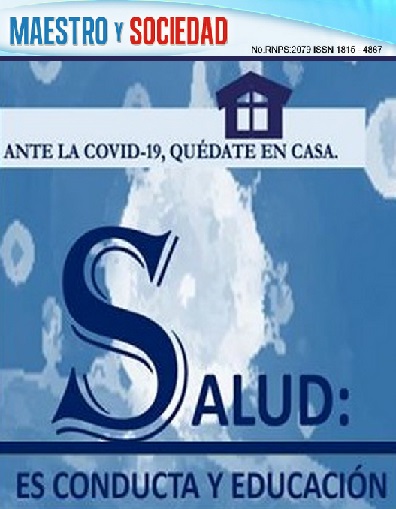Array Array
Array
Palavras-chave:
Array, ArrayResumo
ArrayReferências
2. Crites, J. (1974). Psicología Vocacional. Buenos Aires: Editorial Paidos.
3. Ferrer T., L. M. (2019). Sermo Vulgaris: una multimedia para la enseñanza-aprendizaje del Latín Vulgar. Revista Maestro y Sociedad, (Número Especial Mirada interdisciplinaria a la recepción de los clásicos), 80-90. Recuperado de https://maestroysociedad.uo.edu.cu/index.php/MyS/article/view/5199
4. González P., Y., Rosell L. Y., Piedra S. Y., Leal L. O. y Marín M., F. (2006). Los valores del profesional de la información ante el reto de la introducción de las nuevas tecnologías de la información y la comunicación. Acimed, 14(5). Recuperado de http://bvs.sld.cu/revistas/aci/vol14_5_06/aci07506.htm
5. González R., F. (1987). Motivación profesional en adolescentes y jóvenes. La Habana: Editorial Pueblo y Educación.
6. Ministerio de Educación. (1979). Decreto No. 63 del Comité Ejecutivo del Consejo de Ministro sobre Formación Vocacional y Orientación Profesional. La Habana: Empresa Impresora Gráfica MINED.
7. Parsons, F (1909). Choosing a vocation. Boston: Houghton Mifflin.
8. Rivas, F. (1976). Teorías vocacionales: Enfoques de asesoramiento. Madrid: Morata.
9. Super, D. E. y Bachrach, P. B. (1957). Scientific careers and Vocational development theory. New York: Teachers College Bureary of Pub.
Publicado
Como Citar
Edição
Seção
Licença
Esta revista proporciona un acceso abierto inmediato a su contenido, basado en el principio de que ofrecer al público un acceso libre a las investigaciones ayuda a un mayor intercambio global de conocimiento. Cada autor es responsable del contenido de cada uno de sus artículos. Los artículos pueden ser inéditos o estar disponibles previamente en servidores de preprints reconocidos por la revista. Sin embargo, no se permite la duplicación de la publicación o traducción de un artículo ya publicado en otra revista o como capítulo de un libro.
This journal provides immediate open access to its content, based on the principle that providing the public with free access to research supports a greater global exchange of knowledge. Each author is responsible for the content of each of their articles. Articles may be previously unpublished or available on preprint servers recognized by the journal. However, duplication of publication or translation of an article already published in another journal or as a book chapter is not permitted.
Esta revista oferece acesso aberto imediato ao seu conteúdo, com base no princípio de que oferecer ao público acesso gratuito à pesquisa contribui para um maior intercâmbio global de conhecimento. Cada autor é responsável pelo conteúdo de cada um de seus artigos. Os artigos poderão ser inéditos ou estar previamente disponíveis em servidores de preprints reconhecidos pela revista. No entanto, não é permitida a duplicação de publicação ou tradução de artigo já publicado em outro periódico ou como capítulo de livro.



























 Universidad de Oriente
Universidad de Oriente 